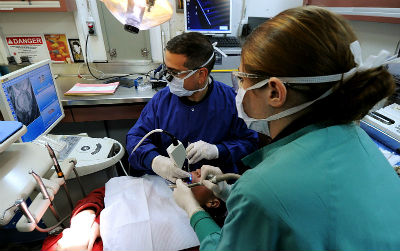Dental Hygienist – Future Outlook, Desired Skills and Education
If you are interested in dentistry, yet you think time and money are your restraints from getting an education, you might want to consider a dental assistant or dental hygienist job. Dental assistants play a support role for a dentist, and dental hygienists work directly with patients to provide preventative dental care and advice. Both can play important roles with every single patient by developing trusting relationships and providing valuable dental services. Best of all, a two-year associate degree qualifies you to go to work!

Job Outlook for Dental Hygienists
With an increasing awareness about the link between oral health and overall health, people tend to visit dental hygienists for oral health check-ups and preventative dental care advice more regularly. Therefore, there has been a growing demand for dental hygienist jobs in the U.S. According to the Bureau of Labor Statistics, job demand will increase 33 percent by 2022, making it one of the fastest-growing careers. Additionally, salaries for dental hygienists are very competitive, with an average hourly wage of $35.87 or an annual income of more than $74,000. Most dental hygienists can also work flexible hours, either full-time or part-time for a few days a week.
Responsibilities and Desired Skills for a Dental Hygienist:
Dental hygienists perform a variety of tasks from dental care and oral health education to office activities:
- Perform screening procedures: assessment of oral health conditions, including health history, oral cancer, head and neck inspection, review of blood pressure and pulse
- Take and develop dental X-rays
- Clean teeth and apply preventive materials such as sealants and fluorides
- Educate patients about daily preventative dental care as well as the impact of good nutrition on oral health
- Complete other administrative tasks
Besides technical expertise, dental hygienists should develop strong interpersonal skills such as communication, flexibility and creativity:
- Communication: Besides performing technical healthcare services, dental hygienists talk with people from different backgrounds to educate them on daily dental care. Additionally, they will have opportunities to work with special groups such as children, the disabled, and the elderly.
- Flexibility: Dental hygienists sometimes work into the evening or during weekends. They can also be hired to perform services in other settings such as schools, rural communities, or even private home visits.
- Creativity: Since dental hygienists work with such diverse groups and in various settings, it is important that they find different ways to approach patients and deliver their services.
Dental Hygienist Associate Degree Program: Start a Career or Prepare for Higher Education
While many four-year schools offer undergraduate and graduate degree in dental hygiene, you can typically save much time and money by obtaining an associate degree in dental hygiene with one of the TGCCCC member schools. After two years focusing on relevant coursework, a graduate can obtain a dental hygiene license to start practicing in any dental office. Another option would be to transfer credits and continue with the bachelor’s degree or pursue dental school. Whichever the option you choose, a two-year degree in dental hygiene would not only give you hands-on experience in dentistry services, but also help you pay for higher education by working in the industry for a few years.
If you are interested in pursuing a dental hygiene job, you can start to learn more about our associate degree programs offered by the Texas Gulf Coast Community Colleges.
